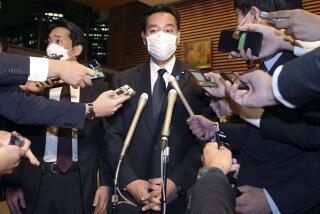Japan Premier’s Remarks of ‘Divine Nation’ Stir Uproar
- Share via
TOKYO — Opposition leaders are demanding that Prime Minister Yoshiro Mori resign after just six weeks in office because he evoked the unquiet ghosts of World War II by calling Japan a “divine nation with the emperor at its center.”
Mori said today that he would explain his remarks to parliament this afternoon but would not retract them. “While I apologize for giving the wrong impression by not conveying my opinion properly, this does not mean I will retract my remarks,” he said this morning.
China’s Foreign Ministry and the South Korean press on Tuesday lambasted the remarks, which Mori made Monday to a Shinto political group. Japanese civil libertarians railed that his statement violated the separation of religion and politics enshrined in the nation’s postwar constitution.
Japan’s largest daily newspaper called the remarks “intemperate” and questioned whether Mori grasped the importance of a prime minister’s statements. And the leaders of Japan’s four major opposition parties demanded that Mori resign.
Even members of Mori’s own Liberal Democratic Party, or LDP, said it was unfortunate that the prime minister had used language reminiscent of Japan’s militaristic era. Wartime propagandists deified the emperor as a living god, made Shinto the state religion and claimed a divine mandate for Japan’s conquests in Asia.
Though Mori is sure to undergo tough questioning today in the upper house of parliament, Japan’s weak opposition does not have the votes to pass a no-confidence resolution forcing his resignation.
The question is how successfully the opposition will be able to use the “divine nation” remarks to damage the LDP in advance of elections expected to be held June 25.
Japan’s political world is already abuzz over whether Mori can survive the summer in office--and who might replace him if he falls.
“Everybody is interested in shortening the political life of Mr. Mori,” Tokyo University political scientist Takashi Inoguchi said Tuesday.
Several Japanese politicians and pundits interviewed Tuesday night privately lamented what they called a lack of intelligence and discretion in their prime minister. And the media delighted in rehashing Mori’s history of controversial remarks.
Mori has, among other gaffes, compared people with AIDS to unwelcome guests; implied that many Okinawans are Communists; said that the city of Osaka is the center of Japan’s pornography industry; and suggested that Korean residents of Yokohama might take up arms, according to press reports. He recently asked whether it would be all right to lie to the pesky reporters who demand to know the prime minister’s every move, up to and including his bedtime.
Even before the “divine nation” remarks, Mori’s popularity had plummeted. A poll taken over the weekend by state-run NHK television found that only 33% of the 1,100 Japanese surveyed supported his Cabinet, down 6 percentage points from April. The percentage of those who did not support Mori increased by 6 points to 37%.
Mori’s credibility has apparently been damaged by tabloid reports of alleged misdeeds while he was a 20-year-old Waseda University student. Mori has said the story is false and demanded a retraction. But the tabloid has refused to apologize.
The NHK poll found that 21% of those who did not support Mori said “he seems to have a bad character,” while 34% said they did not expect his policies to produce any benefits.
Most of those who supported Mori gave an endorsement that was tepid even by the standards of an alienated Japanese electorate. When asked why they supported the government, 32% said they backed the LDP, 28% said Mori’s Cabinet seemed better than the opposition, and 19% said they trusted his good character.
Two of Mori’s senior Cabinet members also are under fire.
The opposition has been pounding on Chief Cabinet Secretary Mikio Aoki for dissembling about what happened in the hours after late Prime Minister Keizo Obuchi was hospitalized with a stroke April 2.
In addition, a jailed former construction minister testified Monday that Finance Minister Kiichi Miyazawa gave him a paper bag containing about $27,000 while Miyazawa was premier in 1991, according to press reports. Miyazawa, 80, told reporters Tuesday that he could not remember the incident.
Mori has defended his remarks about Japan being a divine nation, arguing Tuesday that “this does not contradict the principle of the people’s sovereignty established in the postwar era. With regards to my remarks about the emperor, I meant that he symbolizes Japan’s long history and culture.”
More to Read
Sign up for Essential California
The most important California stories and recommendations in your inbox every morning.
You may occasionally receive promotional content from the Los Angeles Times.













